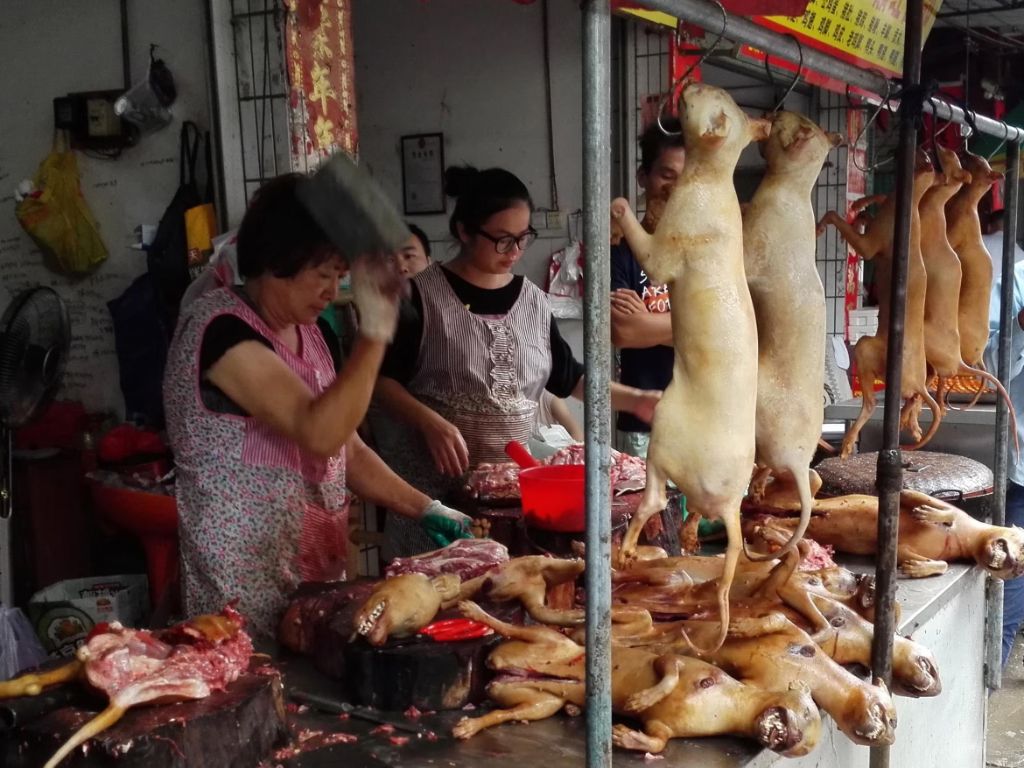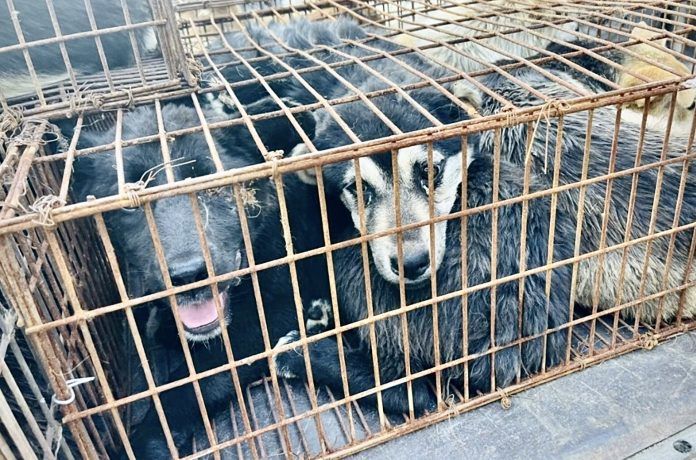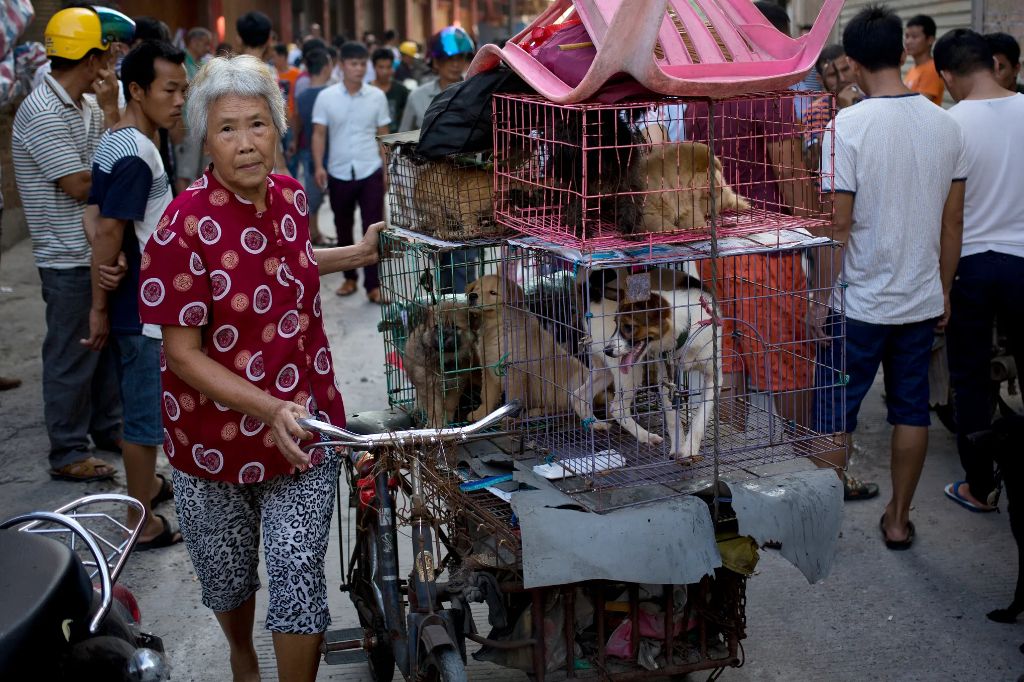Introduction
The Lychee and Dog Meat Festival, commonly known as the “Yulin Dog Meat Festival”, is an annual festival held in Yulin, Guangxi, China during the summer solstice. The festival began in 2009 as a commercial enterprise to generate revenue during the slow lychee harvest season, and features markets that sell dog meat and lychee fruits. Historically, dog meat consumption in China dates back thousands of years, though the practice has diminished in recent decades. However, some regions like Yulin continued the tradition of eating dog meat for its purported health benefits during the hot summer months.
According to the website Duoduo Project, which campaigns against the festival, the origins can be traced to several factors: https://www.duoduoproject.org/post/origins-of-the-yulin-festival-in-china
First, eating dog meat in the summer is seen as having a cooling effect according to traditional Chinese medicine. Second, the lychee harvest created a need for economic activity in Yulin in June. And third, dog meat restaurants organized a festival to boost their profits.
The Yulin Dog Meat Festival
The Yulin Dog Meat Festival takes place every year in Yulin, a prefecture-level city in the Guangxi Zhuang Autonomous Region of southern China. According to Wikipedia, the festival runs annually for 10 days from June 21 to June 30, coinciding with the summer solstice and local lychee harvest (Wikipedia, 2023).
The festival is believed to have begun in 2009 or 2010 to celebrate the summer solstice. Some reports suggest it was started by dog meat traders to generate more business during the slow season (Duoduo Project, 2022). However, eating dog meat in June and July dates back hundreds of years in the region as a way to stay cool during hot summer months.
Over the 10 day event, it is estimated that 10,000-15,000 dogs are slaughtered for consumption. Dog meat restaurants fill up and thousands gather to eat dog meat and lychees while celebrating with beers (Independent, 2018). While the scale has grown over the years, the festival remains controversial both domestically and abroad.

Cultural Significance
Dog meat has a long history in Chinese cuisine and culture, though its popularity and prevalence have declined in recent decades. According to historical records, dog meat was consumed as early as the Shang Dynasty (1600 BC – 1046 BC) and considered a delicacy reserved for royalty during the Zhou Dynasty (1046 BC – 256 BC) [1]. Over time, dog meat became more widely available and was believed to have medicinal properties that could enhance male virility and sensation.
Though dog meat is eaten sporadically across China, some regions have stronger associations with dog cuisine, like Guangxi and Guangdong. The city of Yulin in Guangxi holds an annual dog meat festival on the summer solstice that draws controversy. Supporters consider dog meat a part of their regional food culture and protest against foreign criticism. However, consumption has declined as pet ownership rises and attitudes shift among younger generations.
Overall, the mainstream cultural viewpoint in China has become increasingly critical of dog meat. According to a 2016 survey, 64% of Chinese respondents stated they want the Yulin festival shut down [2]. While some older locals still consume dog meat for health and virility, general demand has fallen as affluence and animal welfare awareness increase nationwide.
Animal Welfare Concerns
The Yulin Dog Meat Festival has faced significant backlash and controversy over animal cruelty and welfare concerns. Many animal rights activists and organizations, both within China and internationally, have protested the festival and called for its end.

Critics argue that the dogs are often stolen pets or strays rounded up in the days leading up to the festival. There are reports that the dogs face inhumane treatment, being crammed into tiny cages and transported long distances without food or water before being brutally killed in front of each other [1]. Activists have documented dogs being bludgeoned, boiled, and blow-torched alive [2].
There are also concerns about unsanitary conditions and public health risks from the slaughter and consumption of dog meat. Many activists argue that the festival promotes needless animal cruelty and does not reflect modern Chinese cultural values, as dog ownership rises and attitudes evolve.
Government Crackdowns
In recent years, the Chinese government has made increasing efforts to crack down on the Yulin Dog Meat Festival due to concerns over food safety, animal cruelty, and the negative international attention it brings. According to the Independent, a 2016 survey found that 64% of Chinese citizens wanted the festival shut down (“Yulin Dog Meat Festival: What is it, how did it start and will it be banned?”, n.d.).

In 2011, over 500 dogs were rescued by Chinese activists after being intercepted by police while being transported to Yulin for slaughter (Humane Society International, n.d.). In 2014, local government officials banned vendors from selling dog meat on main streets and ordered them to remove visible signs advertising dog meat, likely hoping to dampen international criticism while still allowing the festival to continue quietly (No Dogs Left Behind, n.d.).
In 2017, Yulin authorities imposed new restrictions, requiring market vendors to display quarantine certificates and prove the origins of their meat. Over 800 dogs were rescued that year by groups like Humane Society International, who partnered with Chinese animal activists to intercept trucks bringing dogs into the city (Humane Society International, 2017). Despite this, local merchants found ways around restrictions and the festival carried on.
While the Yulin government has imposed limitations, they have yet to enact an outright ban due to reluctance to seem yielding to international pressure. However, a new survey reveals fewer than 20% of Yulin residents oppose a ban, suggesting growing openness to ending the festival (Humane Society International, 2023). It remains to be seen whether increased public and government opposition will lead to the eventual termination of the event.
Declining Popularity
In recent years, the Yulin Dog Meat Festival has seen a significant drop in both dog meat consumption and the number of vendors participating. According to a 2022 report by the Humane Society International, vendor numbers at the festival have declined by 75% to 100 sellers, down from 400 in 2014 (source). Dog meat consumption has also fallen, with estimates of 10,000 to 15,000 dogs slaughtered for the 2022 festival, decreased from previous years where up to 15,000 dogs were killed daily.
This drop in popularity is attributed to growing animal welfare concerns, advocacy campaigns, and changing attitudes, especially among younger generations in China. With fewer local residents supporting the festival, both economically and culturally, the Yulin Dog Meat Festival has struggled to sustain itself in recent years.
Ongoing Advocacy

Despite the decline in popularity, many animal rights activists continue to advocate for banning the Yulin Dog Meat Festival entirely. Groups like Humane Society International have campaigned to raise awareness and shut down the festival, gathering over 11 million signatures on petitions as of 2016 (Source). While the local Yulin government has stated the festival is not officially sponsored, activists push for an explicit ban. According to Humane Society International, Chinese animal groups have indicated that a clear ban from Yulin officials would make enforcement against dog meat traders easier (Source).
Activists emphasize that many Chinese citizens, especially younger generations, increasingly view dog and cat meat consumption as cruel and unsanitary. With growing opposition and reduced attendance, they hope continued pressure on legislators may lead to banning the festival. Groups like Humane Society International and Change.org have ongoing petition campaigns calling for an end to the event. While the Yulin Dog Meat Festival continues at present, activists remain committed to shutting it down completely.
Cultural Shifts
Public attitudes toward dog meat consumption in China have been shifting in recent years. According to a 2020 survey by Humane Society International, 64% of Chinese citizens said they had not eaten dog meat in the previous year, while 69% stated they opposed the dog meat trade. This represents a significant change, as older generations considered dog meat a traditional food. However, with growing pet ownership and changing cultural values, particularly in urban areas, dogs are now seen more as companions rather than livestock.
Much of the opposition to events like the Yulin festival stems from animal cruelty concerns. Images of dogs crammed into tiny cages and killed in front of each other have sparked outrage. Animal welfare groups have led advocacy campaigns calling for bans on the dog meat trade and a transition to more humane practices. While eating dog meat itself may not disappear entirely, events celebrating mass slaughter in inhumane conditions face mounting pressure from the public and government.
The Future of the Festival
Despite ongoing advocacy and protest, the Yulin Dog Meat Festival is still planned to continue as an annual event. However, there are signs the festival’s popularity is waning.
According to a recent survey by Humane Society International, fewer than 20% of Yulin residents oppose a ban on dog and cat meat (https://www.hsi.org/news-resources/ahead-of-chinas-yulin-dog-meat-festival-a-new-survey-reveals-fewer-than-20-of-yulin-residents-oppose-a-dog-and-cat-meat-ban-and-70-say-a-ban-would-have-no-significant-impac/). This suggests shifting cultural attitudes may gradually reduce demand for dog meat. While the Yulin government has not banned the dog meat trade outright, increased regulation and crackdowns have made it more difficult for vendors to operate.
Animal rights activists will likely continue to protest the festival and pressure the government to shut it down completely. However, ending the Yulin festival does not necessarily end the trade in dog meat. While the festival’s future remains uncertain, reducing the overall demand for dog meat in China through shifting cultural norms and attitudes may be the most effective long-term strategy.
Conclusion
The annual Yulin Dog Meat Festival in China has faced growing controversy and declining attendance in recent years. Originally started as a traditional celebration, the festival has drawn intense criticism from animal activists both within China and around the world due to concerns about animal cruelty and unsafe meat handling practices.
While the Yulin government has banned dog meat sales at the festival, enforcement remains inconsistent. However, cultural attitudes appear to be shifting, especially among younger Chinese who increasingly view dogs as pets rather than food. Major Chinese animal welfare groups continue to advocate against the festival, and meat vendors face mounting legal and social pressure to cease the sale and slaughter of dogs.
Though the future is uncertain, it seems likely that this controversial festival will continue evolving in the years ahead, potentially moving away from its dog meat origins. But for now, questions remain around balancing cultural tradition with animal welfare and public health concerns. The debates surrounding Yulin reflect broader changes in modern China as the country grapples with its identity on the global stage.